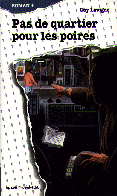


|
Pas de quartier pour les poires.
Guy Lavigne.
Grades 8 - 12 / Ages 13 - 17. *** /4
|

excerpt:
Le sexagénaire, pere de trois filles, bon pratiquant, membre de la Société des Croisés, des Chevaliers de Colomb et retraité de la fonction publique, cumulait en plus l'honneur, grâce à une blessure subie durant la guerre de Corée, d'être semi-pensioneé du ministere de la Défense. Alors, qu'allait-il faire à une heure du matin dans ce bar?
When an elderly man covered in flames staggers into a local bar, the door locks behind him. In the ensuing fire, two patrons die and some are injured. The bar owner, convinced that this is no simple case of arson, turns to a private investigation agency, and so the third novel in the series, Les Dossiers de Joseph E, by Quebec writer Guy Lavigne sets J.E. the task of solving the mystery. Initially, J.E. is mystified by all the unusual suspects and seemingly unnatural allies. What is the role of les Gardes de Saint-Michel, a conservative Catholic group against abortion, pornography, and general moral decay? How are they linked to le Collectif de la forteresse, a feminist group with whom les Gardes had joined to protest neighbourhood prostitution? And what is the role of the Comité pour le logement de l'Ilot-du-Faubourg, who are fighting to preserve their neighbourhood from being bulldozed and redeveloped with luxury condos? As J.E. discovers, someone is manipulating all these not so well-meaning reformers, and the real tale is one of greed and drug trafficking. J.E. is oddly relieved: "Cette affaire, qui au début se donnait des airs de sorcellerie ou d'incendiaire fou voulant jouer au héros, prenait maintenant des allures toute aussi sordides, mais beaucoup plus banales, d'histoire de trafic de drogues. Cela rassurait J.E. de se retrouver en terrain connu." The distance between sanctimonious "suckers" ("les poires"), ready to use violence for the presumed good of society, and ruthless criminals working for private profit is, in fact, slim.
Lavigne borrows all the cliches of the gumshoe genre: the gadgets, the police contacts, and the cynical but tender-hearted detective. Joseph E. is a former drinker, taciturn and given to melancholy. Despite himself, he is mildly homophobic, although apologetically so. In his leisure time, he enjoys reading the poetry of Arthur Rimbaud. He has a well-developed sense of humour:
"Quelqu'un d'autre appelait à la quincaillerie. J.E. se demanda si, cette fois, ce n'était pas un groupe de végétariens renégats prêts à faire sauter la boucherie du quartier."His language is colourful but not offensive, his favourite expletive being "bateche" (a variant of the more blasphemous "baptême"). He also invents expressions as needed: "Merlin de merde!" (43), "Ponce Pilate de merde!" (73). In short, he's a likeable fellow.
The novel's language is typically colloquial and often humourous. The title makes a pun on the double meanings of "poire" ("pear" or "sucker") and "quartier" ("neighbourhood" or "quarter"), suggesting "no neighbourhood for suckers" / "no quarter for suckers" and even a play on "pear quarters". Lavigne sometimes mixes rather dubious metaphors, as in this example:
La pleureuse, sur la galerie avant, croyait peut-être avoir atteint le fond de la fosse septique avec la mort de sa mère . . .In the dialogue, however, Lavigne captures the flavour of the Quebec vernacular along with a certain slang typical of crime novels.
Mais elle avait encore à subir toute la vérité à apprendre qui étaient vraiment son père et sa mère et dans quel genre d'activités ils trempaient. Les balles perdues, depuis longtemps tirées, s'élançaient inexorablement vers la fille et il n'y aurait aucune cachette assez profonde, aucun bunker assez épais pour la protéger.
Lavigne's novel will appeal to adolescent fans of mystery novels. Despite rather weak characterization, the plot is fairly tight, and the narration concise and often amusing. Also, the eminently debatable issue of the validity of using violence to achieve social reform is intriguing. As J.E. muses to himself: "Pauvre société qui avait un médecin pire que sa maladie."
Recommended.
Kathleen L. Kellett-Betsos teaches Quebecois and French-Canadian civilization and literature at Ryerson Polytechnic University.

To comment on this title or this review, send mail to cm@umanitoba.ca.
Copyright © 1997 the Manitoba Library Association. Reproduction for personal use is permitted only if this copyright notice is maintained. Any other reproduction is prohibited without permission.
Published by
The Manitoba Library Association
ISSN 1201-9364
TABLE OF CONTENTS FOR THIS ISSUE - APRIL 11, 1997.
AUTHORS | TITLES | MEDIA REVIEWS | BOOKSHELF | BACK ISSUES | SEARCH | HOME